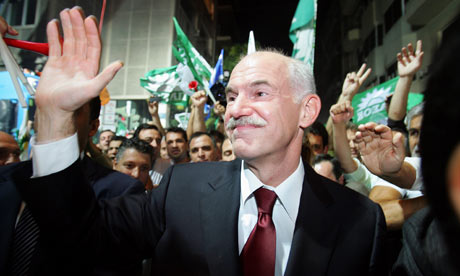
Ankara Reacts Positively to Papandreou’s Stance on Cyprus
Publication: Eurasia Daily Monitor Volume: 6 Issue: 183
By:

The recent election in Greece resulted in a convincing victory for George Papandreou’s Pan-Hellenic Socialist Movement (PASOK). Despite the fact that Turkish-Greek relations were not a major issue during the election campaign, Ankara closely monitored the election. Turkish Foreign Minister Ahmet Davutoglu stated that Turkey has excellent relations with Greece: “Despite some existing difficulties, during the PASOK’s period in power I am sure that Turkey and Greece will maintain good relations” (Zaman, October 6).
Turkish political observers also hope to witness a continued improvement in bilateral relations with the incoming government. The main evidence for this optimism relates to Papandreou. Turkish observers emphasize Papandreou’s constructive role in developing Turkish-Greek relations in 2000. Papandreou was the Greek Foreign Minister at that point and he enjoyed close personal relations with Turkey’s late Foreign Minister Ismail Cem. They set aside all controversial bilateral issues and signed agreements in 2000 as part of a deepening Turkish-Greek dialogue on issues including tourism, the environment, combating terrorism, organized crime, illegal immigration and narcotics trafficking (Today’s Zaman, October 6).
Despite such optimistic expectations, Turkish analysts point out that differences remain over Cyprus and the Aegean. Indeed, the Cyprus question could potentially erupt in the near future, which might damage their relations (Milliyet, October 6). However, it should be noted that Papandreou supported the Annan plan to reunify the island in 2004 –against the wishes of the Greek Cypriot leader Tasos Papadopoulos (Radikal, October 5). Greek Cypriots rejected the U.N. backed reunification plan. Yet, Turkish experts urge caution over expecting too much from the PASOK leader on the issue: “The Greek side had always maintained that the Annan plan would not really work in practice. In 2004 Papandreou supported it with the knowledge that the Greek Cypriots would say ‘no’ to it, anyway” (Today’s Zaman, October 6). Meanwhile, Turkey’s Foreign Minister Ahmet Davutoglu has said that Ankara will continue to put pressure on Athens for the resolution of the Cyprus issue (Star, October 6).
Greek Cypriot newspapers claim that the Greek Cypriot leader Demetris Christofias welcomed PASOK’s electoral success. They argued that Papandreou will support Christofias in his negotiations with the Turkish Cypriot leader Mehmet Ali Talat (www.starkibris.net, October 6).
On the Greek side, analysts share similar optimism. One Greek diplomat pointed out that “Papandreou is very interested in bilateral relations between Turkey and Greece. He already declared during the election campaign that relations with Turkey will be a priority” (Hurriyet Daily News, October 5). In addition to Greek diplomats, political observers also appeared hopeful. The Greek journalist Angeliki Spanou, for instance, argued that “Papandreou is very well known for his efforts to improve relations with Turkey. I think he will give a new impetus to improve relations with Turkey through open dialogue.” Spanou added: “I believe that Papandreou will form coalitions with other governments of E.U. member states. This is positive, but it also puts pressure on Ankara to be more pro-active” (Hurriyet Daily New, October 5).
Given that Davutoglu stressed the term “to put pressure” on Athens while the Greek side considers that Papandreou might “put pressure” on Ankara, it would be safe to say that the characteristics of Turkish-Greek relations will be determined by each side’s aims to mobilize international mechanisms. For Turkey, that mechanism would be the U.N. while Athens will more likely attempt to rally E.U. support to exert pressure on Ankara.
As the Turkish expert Sema Sezer noted, the December E.U. summit at which Turkish compliance with the Ankara protocol will be reviewed might provide the “first test” for Papandreou. However, Davutoglu has stressed finding a solution under the U.N. umbrella. Davutoglu has also accused the Greek Cypriot side of being unconstructive in the ongoing reunification talks held under United Nations patronage. Among other issues, he blamed Christofias for having declined a meeting in New York in the trilateral format, with Ali Talat and a Turkish delegation (Hurriyet Daily News, October 5).
From this perspective it might be premature to expect any further positive developments on the Cyprus issue based solely on the PASOK victory in Athens. However, since Papandreou favored the Annan plan in 2004, Turkish diplomats may consider utilizing this to maximize pressure on Greece to place the issue under the U.N. rather than discussing it in the E.U. context.




